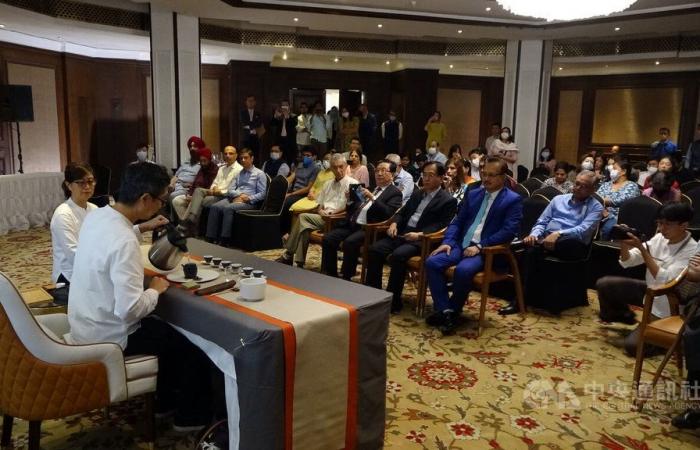Here is How Taiwan’s internship scholarship gets Indian tea value-added
Taiwan’s Ministry of Education has been providing “Scholarship of Overseas Internship” to students every year since 2007.
NEW DELHI/PAIPEI: A 20-member delegation from the College of Agriculture and Natural Resource, National Chung Hsing University come to India this August for a one-month internship and visitation. This programme mainly helps Taiwanese students to broaden their horizons about the tea industry in India and exchange opinions with Indian experts, as well as created opportunities for economic cooperation in terms of processing machines, packaging, and related technology. Interns can benefit economic development.
Taiwan is a life-long learning society and many people or business owners keep pursuing EMBA, Master degree or PhD degree, even they already got Master degree long time back. Some of the students themselves are owners of SMEs or tea plantation in this delegation, which create the opportunities for bilateral cooperation on research, skills, trade and technological application as well.
One of the internship host, Raj Baroah, Founder and Director of Rujani Tea in Assam, shared his positive observations on the prospects of Indo-Taiwan tea cooperation, including application of chips in plantation monitoring management, which has never used in Assam plantation.
Gogoi Maddhurjya, a small tea farmer in Assam, told his experience of making tea successfully by using tea-processing equipment imported from Taiwan to increase productivity. He has spent more than 20 years to find out the best solution to improve his plantation and production.
He visited Japan to learn handmade and high valued tea, however, it didn’t work in Assam due to labour skill and cost. After visiting many countries, he found Taiwan’s processing machine is the best solution for his small and medium size plantation to produce the tea with the best quality and revenue. Now, with these know-how, he exported his tea to 7 countries. This was happened since he received the inters in 2017 for the first time. He added, “Taiwan’s Professors and students can stay up overnight to help on shaking, pan-firing or rolling tea leaves, or observe and find out the problem of bamboo try for the withering tea leaves.”
 This year, students, when visited an organic farm at Thaizawl of Mizoram, used many methods to try to find the special aroma in the Indian tea essence, and successfully made several kinds of tea with different and unique flavor. One of the intern Qiu Guanjun said that they successfully found the right tea essence and made alpine oolong tea, black tea, and white tea, which has been very popular among Taiwan’s tea lovers. Chief Minister of Mizoram State, Zoramthanga received the professors and students in person and expect more cooperation in the near future.
This year, students, when visited an organic farm at Thaizawl of Mizoram, used many methods to try to find the special aroma in the Indian tea essence, and successfully made several kinds of tea with different and unique flavor. One of the intern Qiu Guanjun said that they successfully found the right tea essence and made alpine oolong tea, black tea, and white tea, which has been very popular among Taiwan’s tea lovers. Chief Minister of Mizoram State, Zoramthanga received the professors and students in person and expect more cooperation in the near future.
In addition to have internship at tea plantation in Assam, Mizoram, and Meghalaya, the tea ceremony activity of “Chai pe Charcha with Taiwan” was held in Delhi on August 26th. 150 participants from related industry were offered to taste Taiwan’s tea and the Assamese tea which grown in Assam and were processed by Taiwanese machine. Guests also tasted the famous Taiwanese “bubble milk tea”, a sweetly flavored cold milky beverage with chewy bubble. Doctoral programme student Alex Ng of the Department of Agronomy presented the Taiwanese tea ceremony, attracting full attention of Indian guests.
Prof. Chi-Ming Hsieh of International Master Program of Agriculture, NCHU, Presented on agritourism to Indian participants. He took kiwi as example to show the value added agricultural product from primary level, processing level and to tertiary level. One kiwi can sell from Rs.25 for original fruit to Rs. 120 of kiwi jam. If we can sell kiwi jam in a fruit garden or bungalow with natural characteristic, the price will go to Rs. 250. It will happen to tea industry if we make tea with tea knowledge, special aroma and professional packaging.
Interns found that Indian tea production tends to be large-scale industrialized with simple taste and lower price in market, while Taiwan places more emphasis on artistry, expressing the local culture, climate and organic soil characteristics of the origin on the tea leaves in certain tea plantation. Make your own GI is getting more important for international trade.
Students obtain the opportunity to understand Indian culture and upgrade their skills and knowledge by the internship. Moreover, both sides tried to make tea with Taiwan’s technology and Indian tea essence in a more productive and efficient way, which is a reciprocal and successful internship programme, after 2-year suspension.
Such win-win programme allow interns to become immersed in real-world experiences and develop their skills in a preferred local industry. In order to encourage Taiwanese students to have internship overseas, the Ministry of Education Taiwan actively to provide outbound scholarship for Taiwanese students to come to India, in addition to inbound scholarship for Indian students to study in Taiwan. This internship scholarship matches India’s policies of “Study in India” and “Skill Development”, and we look forward more opportunities to see young people from Taiwan to exchange ideas with Indian experts for their brighter future and bilateral relations.



